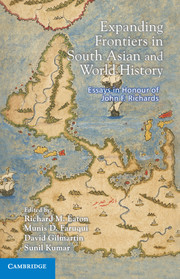Book contents
- Frontmatter
- Contents
- List of Contributors
- Foreword
- Introduction
- 1 At Empire's End: The Nizam, Hyderabad and Eighteenth-century India
- 2 The Ignored Elites: Turks, Mongols and a Persian Secretarial Class in the Early Delhi Sultanate
- 3 ‘Silk Road, Cotton Road or … Indo-Chinese Trade in Pre-European Times’
- 4 The Political Economy of Opium Smuggling in Early Nineteenth Century India: Leakage or Resistance?
- 5 Opium and the Company: Maritime Trade and Imperial Finances on Java, 1684–1796
- 6 The Mughals, the Sufi Shaikhs and the Formation of the Akbari Dispensation
- 7 Notes on Political Thought in Medieval and Early Modern South India
- 8 Becoming Turk the Rajput Way: Conversion and Identity in an Indian Warrior Narrative
- 9 Nature and Nurture on Imperial China's Frontiers
- 10 The Frontiers of Memory: What the Marathas Remembered of Vijayanagara
- 11 ‘Kiss My Foot,’ Said the King: Firearms, Diplomacy and the Battle for Raichur, 1520
- 12 Frontiers of Family Life: Early Modern Atlantic and Indian Ocean Worlds
- 13 Chinese Revenue Farms and Borders in Southeast Asia
- Publications
- Index
8 - Becoming Turk the Rajput Way: Conversion and Identity in an Indian Warrior Narrative
Published online by Cambridge University Press: 05 January 2014
- Frontmatter
- Contents
- List of Contributors
- Foreword
- Introduction
- 1 At Empire's End: The Nizam, Hyderabad and Eighteenth-century India
- 2 The Ignored Elites: Turks, Mongols and a Persian Secretarial Class in the Early Delhi Sultanate
- 3 ‘Silk Road, Cotton Road or … Indo-Chinese Trade in Pre-European Times’
- 4 The Political Economy of Opium Smuggling in Early Nineteenth Century India: Leakage or Resistance?
- 5 Opium and the Company: Maritime Trade and Imperial Finances on Java, 1684–1796
- 6 The Mughals, the Sufi Shaikhs and the Formation of the Akbari Dispensation
- 7 Notes on Political Thought in Medieval and Early Modern South India
- 8 Becoming Turk the Rajput Way: Conversion and Identity in an Indian Warrior Narrative
- 9 Nature and Nurture on Imperial China's Frontiers
- 10 The Frontiers of Memory: What the Marathas Remembered of Vijayanagara
- 11 ‘Kiss My Foot,’ Said the King: Firearms, Diplomacy and the Battle for Raichur, 1520
- 12 Frontiers of Family Life: Early Modern Atlantic and Indian Ocean Worlds
- 13 Chinese Revenue Farms and Borders in Southeast Asia
- Publications
- Index
Summary
INTRODUCTION
In 1974, John F. Richards noted, ‘Muslim expansion into South Asia is one of the most important and prolonged instances of cultural encounter to be found in world history’. Considerably more is known today about the processes of Muslim expansion in the subcontinent than when these words were written, over thirty years ago. However, much of the scholarship on the spread of Islam is from the vantage point of Muslim courts and the Persian literature they produced; alternatively, it examines the process of Islamization only on a large scale. In this essay I adopt a different approach, one that is microhistorical. Relying primarily on a single text, I explore how an Indian Muslim gentry community represented their past and articulated their present identity. The text is the Kyamkhan Rasa (henceforth KKR), composed between c. 1630 and 1655 at Fatehpur, a town in the Shekhavati region of northern Rajasthan. Its author Nyamat Khan used the pseudonym Jan Kavi in writing this poem in Braj Bhasa, the literary language of Hindi, that covers the history of his lineage, the Kyamkhanis, so named after the ancestor who is supposed to have converted to Islam in the fourteenth century.
By the late sixteenth century, the Kyamkhanis were a well-established community with two main branches. The senior branch was entrenched in the town of Fatehpur (in modern Sikar district, Rajasthan), founded c. 1450 by Fateh Khan, the senior grandson of Kyam Khan, the founder of the clan. A junior branch had been established in the nearby town of Jhunjhunu (in modern Jhunjhunu district) by Kyam Khan’s second son.
- Type
- Chapter
- Information
- Expanding Frontiers in South Asian and World HistoryEssays in Honour of John F. Richards, pp. 200 - 231Publisher: Cambridge University PressPrint publication year: 2013



